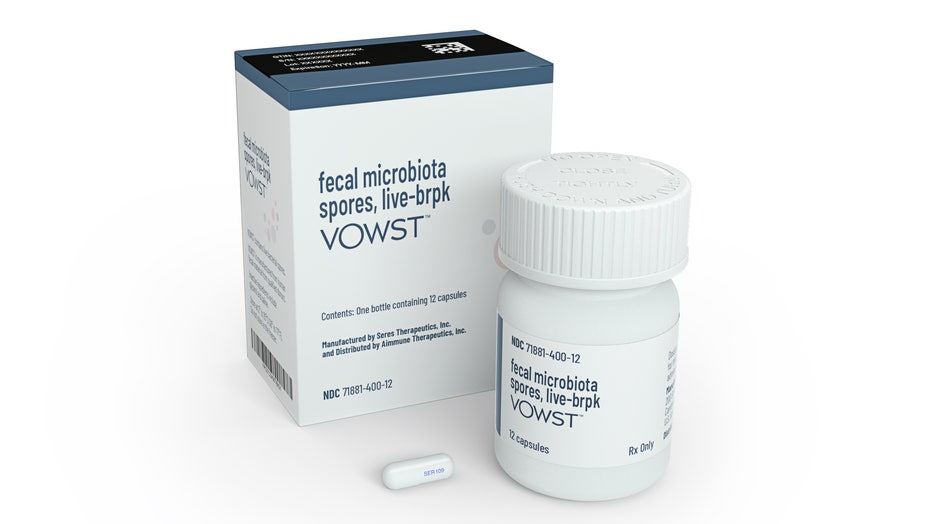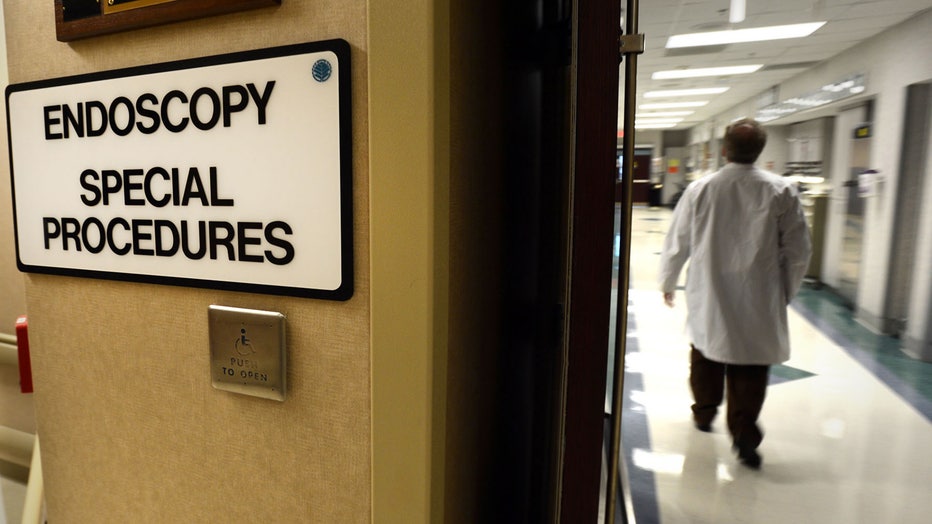FDA approves first ever pill for fecal transplants

Over-the-counter Narcan approved for sale by the FDA | LiveNOW from FOX
The U.S. Food and Drug Administration approved selling naloxone without a prescription, setting the overdose-reversing drug on course to become the first opioid treatment drug to be sold over the counter. Dr. Peter Chin-Hong from University of California, San Francisco spoke with LiveNOW's Andrew Craft about the FDA's decision to approve the over-the-counter sale of Narcan. More LiveNOW from FOX streaming video
U.S. health officials on Wednesday approved the first pill made from healthy bacteria found in human waste to fight dangerous gut infections — an easier way of performing so-called fecal transplants.
The new treatment from Seres Therapeutics provides a simpler, rigorously tested version of stool-based procedures that some medical specialists have used for more than a decade to help patients.
The Food and Drug Administration cleared the capsules for adults 18 and older who face risks from repeat infections with Clostridium difficile, a bacteria that can cause severe nausea, cramping and diarrhea.
C. diff is particularly dangerous when it reoccurs, leading to between 15,000 and 30,000 deaths per year. It can be killed with antibiotics but they also destroy good bacteria that live in the gut, leaving it more susceptible to future infections. The new capsules are approved for patients who have already received antibiotic treatment.

Vowst (Seres Pharmaceuticals)
More than 10 years ago, some doctors began reporting success with fecal transplants — using stool from a healthy donor — to restore the gut’s healthy balance and prevent reinfections.
The FDA approved the first pharmaceutical-grade version of the treatment last year from a rival drugmaker, Ferring Pharmaceuticals. But that company's product — like most of the original procedures — must be delivered via the rectum.
READ MORE: FDA approves robotic bassinet to help keep babies sleeping on their backs
Cambridge Massachusetts-based Seres will market its drug as a less invasive option. The treatment will be sold under the brand name Vowst and comes as a regimen of four daily capsules taken for three consecutive days.
Both of the recent FDA approvals are the product of years of pharmaceutical industry research into the microbiome, the community of bacteria, viruses and fungi that live in the gut.
Currently most fecal transplants are provided by a network of stool banks that have popped up at medical institutions and hospitals across the country.

Dr. Barry Schneider, a gastroenterologist at Carolinas Medical Center-University, makes his way to the lab prior to a fecal transplant procedure at CMC-University, February 8, 2013. (Todd Sumlin/Charlotte Observer/Tribune News Service via Getty Image
While the availability of new FDA-approved options is expected to decrease demand for donations from stool banks, some plan to stay open.
OpenBiome, the largest stool bank in the U.S., said it will keep serving patients who aren't eligible for the FDA-approved products, such as children and adults with treatment-resistant cases. It has supplied more than 65,000 stool samples for C. diff patients since 2013.
"OpenBiome is committed to maintaining safe access to ‘fecal transplantation’ for these patients as a vital last line of defense," said Dr. Majdi Osman, the group's medical chief.
READ MORE: Deadly fungal infection C. auris spreading at 'alarming rate,' CDC says
OpenBiome's standard stool treatment costs less than $1,700 and is typically delivered as a frozen solution within days of ordering. Seres did not disclose the price it will charge for its capsules in a statement Wednesday evening.
"We want to make the commercial experience for physicians and patients as easy as possible," said Eric Shaff, the company’s chief executive officer, in an interview ahead of the announcement. "Ease of administration — in our view — is one of the aspects of the value we’re delivering."
READ MORE: FDA approves over-the-counter Narcan: Here's what it means
Seres will co-market the treatment with Swiss food giant Nestle, which will also split the profits. Seres will receive a $125 million milestone payment from Nestle in connection with the FDA approval.
Overseeing the fledgling industry of U.S. stool banks has created regulatory headaches for the FDA, which doesn’t traditionally police homemade products and procedures used in doctor's offices. In the early days of the trend, the FDA warned consumers about the risks of potential infections from the fecal transplants, as some people sought out questionable "do it yourself" methods from videos and websites.

Experimental cancer vaccine shows promising results in animal study
An experimental therapeutic cancer vaccine has led to ''significant tumor regression in mice' a new study finds.
Seres executives say their manufacturing process relies on the same techniques and equipment used to purify blood products and other biologic therapies.
The company starts with stool provided by a small group of donors who are screened for various health risks and conditions. Their stool is likewise tested for dozens of potential viruses, infections and parasites.
The company then processes the samples to remove the waste, isolate the healthy bacteria and kill any other lingering organisms. Thousands of capsules can be made from each stool sample, making it a more efficient process than current fecal transplants, according to the company.
READ MORE: Can't take statins? New pill cuts cholesterol, heart attacks: study
The FDA warned in its approval announcement that the drug "may carry a risk of transmitting infectious agents. It is also possible for Vowst to contain food allergens," the agency noted.
The FDA approved the treatment based on a 180-patient study in which nearly 88% of patients taking the capsules did not experience reinfection after 8 weeks, compared with 60% of those who received dummy pills.
Common side effects included abdominal swelling, constipation and diarrhea.

